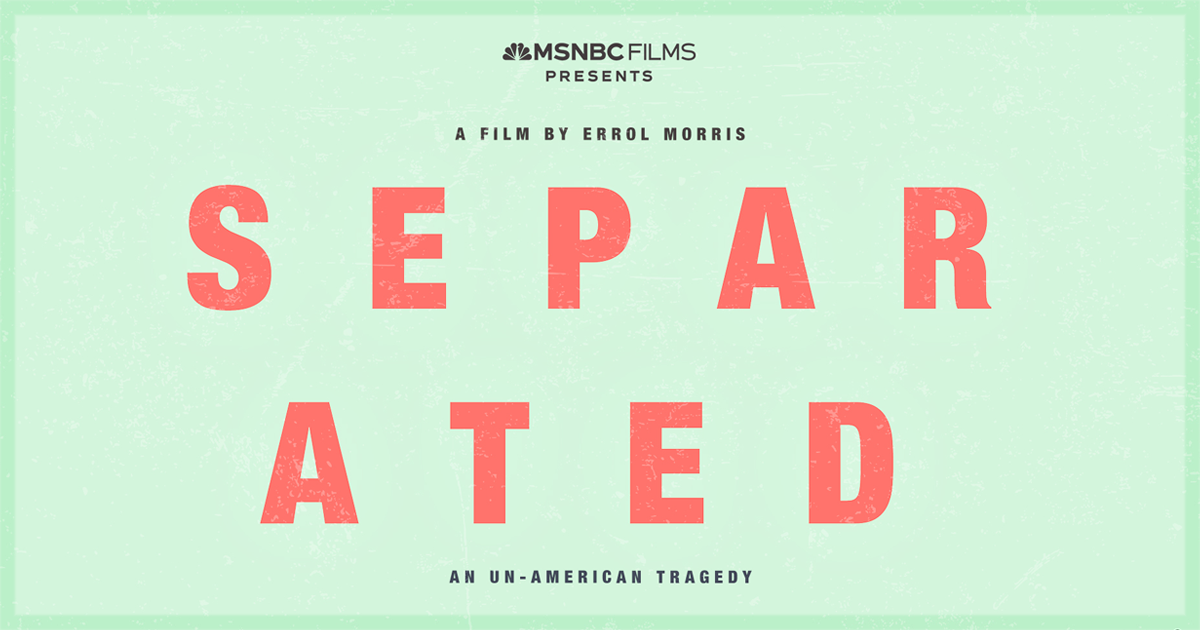Errol Morris is a legend in the documentary community. His highly engaging and provocative films have been echoing in the film industry since the 1970s, including titles like The Thin Blue Line, Gates of Heaven, and The Fog of War, which won the Academy Award for Best Documentary Feature in 2004. In awe of a close and polarized presidential election, Morris and the distributor MSNBC decided to launch his latest, Separated, a month before the election. The film world premiered at the 81st Biennale di Venezia before heading to a North American premiere at the 51st Telluride Film Festival. Later, MSNBC acquired the film and programmed the film to broadcast on December 7th, 2024.
Based on the book Separated: Inside an American Tragedy by journalist Jacob Soboroff, the film uses a hybrid-documentary disposal to tell its narrative. Morris has partnered with the Academy Award-winning production designer Eugenio Caballero to build the sets that locate the fictionalized scenes. Narrating the shocking reality observed by Soboroff in a field visitation in one of the immigration children jails upon the Trump administration, the director divides his films into interviews with state analysts, Soboroff, and scenes with actors Gabriela Cartol and Diego Armando Lara Lagunes. The film shifts from the experiences of workers in the Office of Refugee Resettlement, such as Jonathan White, who served as a deputy director. He narrates from an institutionalized view the beginning of a state-funded plan to separate illegal families as a public policy to terrorize the possible new immigrants.
The interviews draw a detailed view of the plan that started during the 2016 election campaign. The state agents carefully confessed to each of the meetings that they heard about the dehumanizing plan of separating families, prosecuting the parents, and jailing the children in overpopulated spaces. Morris portrays visually the communications through an e-mail written on the screen. It is a creative solution to fill the gaps in moments that do not have archival footage. In this sense, plenty of central moments of the thesis rely on this maneuver to present visual information to the viewer. Most of the time, it works efficiently, but somewhere near its final thirty minutes, it loses the momentum to present newer info rather than developing what he introduced before.
The most fascinating part of Morris’ investigation of the dehumanization of immigrants is the confrontations he provokes through his questions. The writing of the questions is excellent, but his voice intonation adds nuances to the answers through a provocative tone. His deep voice engages the viewer in promptly listening to answers from those involved with the problematic jailing crisis. The film has its highlights when Morris asks questions and demands complex responses from an immoral process. Also, Soboroff contributes a lot with his critical thinking upon a situation that he saw closely in camps that he went to by invitation of the government.
Besides the fascinating proposition of recreating a family immigration from Guatemala to the United States, the segment does not work as a whole. It deviates from the whole construction of tension created by the interviews and excerpts of archives. It operates more as an idea that is gorgeously shot and designed, but on an emotional level – it does not perform as the director may have intended. It left an impression of two different films that do not coexist perfectly together.
On the other hand, the political and bureaucratic discussions are utterly relevant and intriguing. Morris is not afraid of going into an attack against the Trump administration and all of the problems involving immigration policy. He understands the gravity of a possible return from Trump to the presidential chair. Aware of all of the dangers that surround that return, he makes a clear statement against the American far-right and its simplistic solutions to an immensely complex issue, which is the immigration crisis. In a pivotal moment that precedes one of the most critical electoral processes in the history of the United States, an essential and influential director such as Errol Morris delivers a crucial piece to engage in the public political debate.
Separated has a sharp Errol Morris interested in criticizing the inhumane immigration politics that Donald Trump coordinated in his mandate. Even though some ideas do not land, it is a highly relevant discussion. Morris looks forward to documenting a political choice that may occur again if Trump gets elected for a new mandate. The desire of the director to release the film theatrically a month before the election justifies his urge to provide new evidence against the American far-right.
Separated was released in October of 2024. It recently debuted on MSNBC.
Learn more about the film at the MSNBC website for the title.


